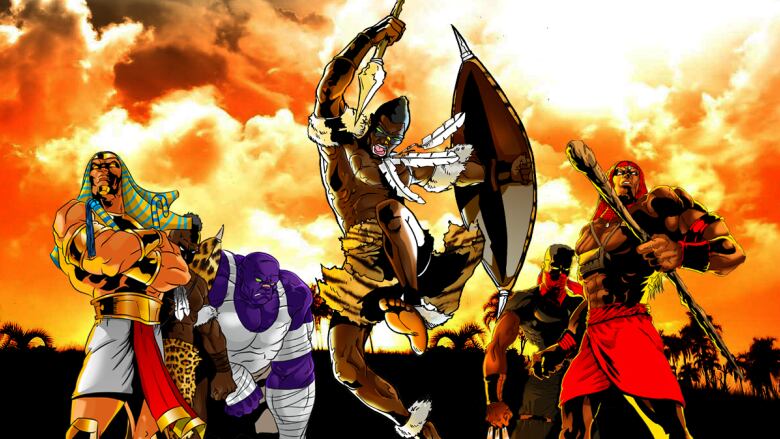African superheroes take flight in video games
Leti Arts a pioneer in African gaming market

The fantasy for Eyram Tawia began, as it has for millions of children before him, thumbing through comic books.
"When I saw Superman fly, I'm like: 'How can I see myself doing that?' " he recalls.
A couple of decades later, the 31-year-old Tawia has that superpower and many more at his fingertips in his office in Accra, Ghana.
He is the co-founder of Leti Arts, an African company that is playing a key role in building the comic and gaming industry on the continent from the ground up.
The centrepiece of the fledgling company is its mobile game, Africa’s Legends, and the digital comic books that will explore the stories of each of its characters.
But Africa’s Legends differs markedly from other comics and games. All of its superheroes and villains are African.
When Tawia was getting hooked on comics as a child, his favourite characters — from Superman to Spider-Man to Thor — were all Caucasian.
Not much of a following
Eventually, he began to question that.
"Why do black superheroes struggle to be popular, even in the Marvel universe, the DC universe? They are either add-ons or they don’t have much of a following."

He met Wesley Kirinya, a fellow comic and gaming enthusiast from Kenya, online and the pair set about to change that.
The Africa’s Legends characters are based on or inspired by folklore from across the continent.
Characters include Ananse the West African god of wisdom, the conqueror and warrior king Shaka Zulu of South Africa and Pharoah, based on Egyptian rulers.
Tawia likens them to The Avengers of Africa, age-old characters fighting modern evil on the continent.
Overcoming inferiority
"Bringing back our girls, cleaning out the pirates on the shores [of Somalia and Kenya], pushing out greedy presidents," Tawia says. "You know, we just want to create this franchise that people will cling to."
A big part of realizing the vision for Leti Arts is tackling a sense of inferiority that seems ingrained in many African youth.
It was my biggest dream, but I never thought it would be possible.- Rudolf Zejlo
"When something really exciting happens, there’s always an attribution to a Western influence," says online marketing and business manager Nana Kwabena Owusu of Accra.
“Either the person is trained outside of Africa [or] the person is schooled in Harvard, so it always feels as if you can’t really be schooled in Africa, live in Africa and do world-class things and that’s what we’re trying combat."
Leti Arts interns Rudolf Zejlo and Robert Grayson Dzamedzi both grew up with that sense of limitation.
A talented illustrator, Zejlo never thought his sketches would amount to anything more than a fun hobby. He couldn't imagine realizing his ambition of becoming a game developer.
"It was my biggest dream, but I never thought it would be possible," Zejlo says.
Then, right out of high school, he began an internship with Leti Arts and today, he and Grayson Dzamedzi are working on a child-friendy version of Africa’s Legends called Africa's Legends Scouts.
Bright future
Dzamedzi studied animation at college and even now, as he adds artistic shading to the hands of a miniature African superhero, he is thinking of the next step to become a game developer: learning programming.
"The future is really bright," he says. "So bright I need spectacles to see it."
Leti Arts is looking to the future, too, counting on recent successes — like winning a prestigious industry award, the Vodaphone Appstar, for best developed application — to bring it to bigger and better things.
“Right now, we’re just making simple games to gain some traction,” Tawia says, but ultimately he sees his company becoming a a big player in the global gaming industry, complete with high-end games.
“Once serious investment has been made in quality games then yes, those games will definitely be paid for.”
Growth is already in the works as Leti Arts negotiates a presence on other platforms.
Its biggest market is outside Africa, the diaspora and gamers who are drawn to the uniquely African superhero universe.
But Tawia says the games and comics will always be created in Africa to inspire African kids to think big.
“We bridge the gap by bringing all the black superheroes flying and doing all the cool stuff,” he says.
"That then psychologically works on the mind of every kid.”

